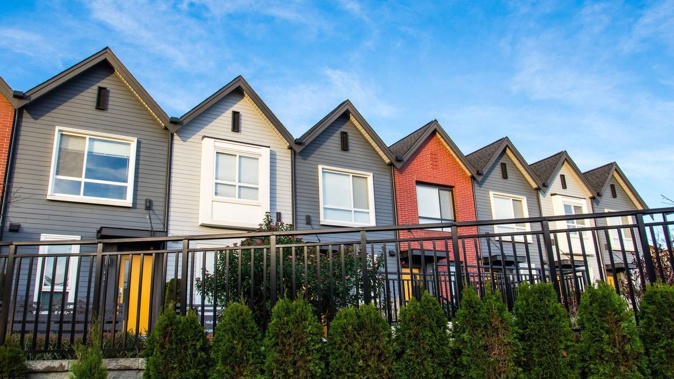
Long considered less valuable than freehold land titles, could cross leases gain popularity as a way to stop new townhouse and apartment developments springing up on your doorstep. Ben Leahy investigates.
A young Auckland family are warning others about the stress cross leases can bring after a two-year dispute with their neighbour drained their savings and went to the High Court.
Theola and Sabih Blaauw refused a neighbour’s request to convert their shared land from a cross lease title to freehold, saying they wanted to protect the sea view and “quiet environment” at their Eastern Beach home.
They believe new planning rules making it easier to build high-density housing across Auckland will lead to more neighbour fights among the city’s 100,000-plus cross-lease property owners.
Theola Blaauw said their neighbour told them they wanted a freehold title to make it easier to rebuild their rundown 1940s home.
But a change to freehold would have also given her neighbour greater freedom to sell to a developer, who could then potentially build up to three townhouses on the land, each three storeys high.
Blaauw feared this would devalue her own property and claimed her neighbour didn’t do enough to reassure them they weren’t planning to do this.
She told the Herald that in her opinion it felt like they were trying to push through the title conversion “simply so they can benefit financially from a property development”.
Almost 20 per cent of all Auckland’s land titles are cross leases, with home buyers typically considering them less valuable.
That’s because owners require permission from their neighbours on the cross lease before they can do major - and sometimes minor - alterations to their homes.
By contrast, freehold homeowners can do what they want on their properties, provided they comply with planning laws.
/cloudfront-ap-southeast-2.images.arcpublishing.com/nzme/3S6JTPSTVRB6NO2NK5G3NTWQOQ.jpg) Theola and Sabih Blaauw with their children, at Eastern Beach. Photo / Alex Burton
Theola and Sabih Blaauw with their children, at Eastern Beach. Photo / Alex Burton
While a cross lease title has typically been a disadvantage, Blaauw believes they could now become more desirable in suburbs popular with families, who may want to stop medium-density developments springing up on their doorsteps since new planning rules came into effect last August.
The Medium Density Standards brought in by the Government force councils across the country to promote the building of more townhouses and apartments.
In Auckland, this means most homeowners can build up to three dwellings on their land without getting resource consent from Auckland Council first, although they must comply with other regulations.
Blaauw’s neighbour did not provide comment to the Herald.
But court documents show the neighbour believes it is the Blaauw family who have been unreasonable in stopping them from rebuilding the rundown home into a modern and healthy house.
‘Rebuild or sell to developers?’
Blaauw said the trouble began in July 2021 when her neighbour first approached them to talk about the pros and cons of converting the land into two, separate freehold titles rather than one cross lease.
The Blaauws, who bought their home in 2019, say they had worked hard to save enough for a family home where they could raise their two children in a quiet and popular school zone, close to the beach.
From their master bedroom, they have a small but “precious” waterfront view.
Their neighbour’s home at the property’s front is a 1940s two-storey homestead with water views.
The home has been in the neighbour’s family since 1969, but not been maintained. Court documents filed by the neighbour said it was leaky, draughty and contained asbestos among other issues that made it unsuitable for living.
The neighbour said that without a freehold title to make it easier to get a bank loan, she won’t be able to rebuild and live in a safe, warm house like those around her do, including the Blaauws.
/cloudfront-ap-southeast-2.images.arcpublishing.com/nzme/CW5BU6ZI45ACNP7GKW3LYDUR5A.jpg) Freehold homeowners can do what they want on their properties, provided they comply with planning laws.
Freehold homeowners can do what they want on their properties, provided they comply with planning laws.
“I can see myself and my family will be forced to continue living in a cold, draughty, small, substandard house ... as opposed to created a safe , warm home with adequate space to live in ... just like every other home in the area,” the neighbour said in her affidavit.
She also said she knew that “under the Unitary Plan, I could get permission to put in three townhouses, but I do not intend to do that”.
Blaauw claimed to the Herald her neighbour initially told her that converting to two freehold titles would automatically increase the value of both houses because freehold homes are typically considered more valuable.
Then, she says, the neighbour sent her title conversion documents to sign.
But after getting legal advice, Blaauw told her neighbour she needed more information.
She claimed she was willing to support her neighbour to build a new home; however, she wanted assurances her sea view would be protected and that any redevelopment wouldn’t come too close to her own home and lessen its value or privacy by creating excessive noise and parking.
However, she claimed her neighbour only presented “vague”, preliminary architectural plans.
The neighbour said in the court documents that it was expensive and unfair to be asked to get formal building plans drawn up when she hadn’t decided what to build or how to maximise use of her land.
The neighbour then took the Blaauws to the High Court, where
the parties were ordered into mediation.
The Blaauws hired a valuer who provided evidence they were not being given enough information to judge exactly how much their home’s value and enjoyment would be impacted.
However, he testified that if the title was converted to freehold, it would “significantly reduce the value” of the Blaauws’ home and “provide a significant windfall gain” to their neighbours.
Eventually, Blaauw’s neighbour abandoned the effort to convert the land to freehold and paid half the Blaauws’ legal costs.
The neighbour has now put her home up for sale on its existing cross lease title.
‘Bulldoze’ negotiations?
Blaauw said one of her main issues was that her neighbour hired a company called Cross Lease Converter.
She accused it of trying to “bulldoze” through the process rather than negotiate in good faith.
Cross Lease Converter offers customers a fixed fee to undertake most of the work to convert titles.
Brent Clode, from the company, said it has completed more than 100 title conversions in recent years and most cases go smoothly because both parties want to go to freehold.
/cloudfront-ap-southeast-2.images.arcpublishing.com/nzme/WSJRC7Z24RBFFMEREMSXNJ4NCM.jpg) The Blauuws don't want to lose their small but "precious" view out to the water at Eastern Beach. Photo / Alex Burton
The Blauuws don't want to lose their small but "precious" view out to the water at Eastern Beach. Photo / Alex Burton
He said the Blaauws’ neighbours had genuinely wanted to build a new home for themselves rather than sell to developers.
So when it appeared the Blaauws wouldn’t agree, Cross Lease Converters decided to push ahead with the conversion anyway and go to the High Court, he said.
“If you’ve got someone not wanting to participate in the process, why would we involve them in that,” he said.
He believes cross leases are a relic of the past.
Cross leases became popular in the 1960s as a way to circumvent rules at the time, but are now a ticking time bomb, according to Clode, who was a 1988 Olympic kayaker and has a long history in development, including being fined in 2002 for the death of a worker on one of his sites.
That’s because many of the 1960s homes are starting to need major repairs, but under cross leases any change to the footprint of the land, such as by building a new shed or deck can require neighbours’ permission and expensive paperwork changes through Auckland Council.
Why would people risk spending millions of dollars rebuilding their homes when their plans can at any time be held up by the neighbours, he asked.
He also agreed cross leases could play a role in holding up Government plans to boost intensive housing development in the city because they give people power to stop others from developing.
Clode wants the law changed making it mandatory that if one homeowner wants to go to freehold title, their neighbours have no option but to agree.
But Blaauw said there is a difference between a neighbour building a new family home and selling to developers.
That is why she is speaking out to raise awareness about the issue, saying it forced her family to spend their savings and take out an extra loan to pay legal fees.
“I think there is not a lot of awareness because people just give in and move on because they can’t afford to go through the legal process or they don’t actually know how to go through it,” she said.
Take your Radio, Podcasts and Music with you









